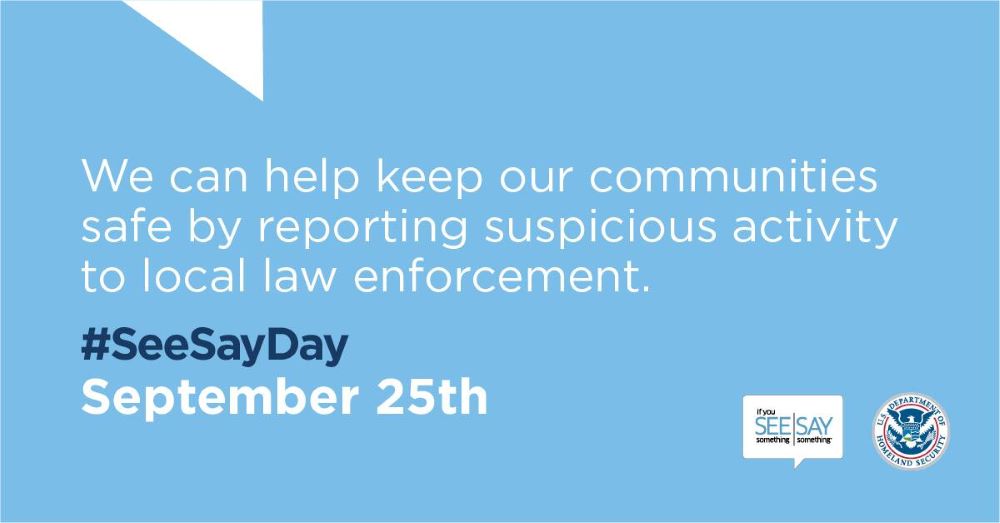The threat landscape across our country has changed in recent years. Threats are impacting every corner of society—from the horrific grocery store mass shooting in Buffalo, NY and the school shooting in Uvalde, TX, to attacks on places of worship and hospitals. College campuses are no exception. For example, Historically Black Colleges and Universities have seen a significant increase in reported bomb threats during 2022. Campuses can be particularly vulnerable, as the return to campus means more crowds and events that could potentially be targeted by acts of terrorism or violent extremism.
As a campus safety professional, you play an important role in raising awareness on campus on how to identify and report suspicious activity to local authorities. The U.S. Department of Homeland Security’s (DHS) “If You See Something, Say Something®” campaign has free tools and resources to help.
Hopefully, your students and employees will never encounter something suspicious on campus. But if they do, you’ll want to make sure they know what to do.
What Is Suspicious Activity?
Suspicious activity is any observed behavior that could indicate pre-operational planning related to terrorism or other criminal activity. Criminals, including terrorists, often engage in some type of precursor action(s) to carry out their illegal activities. These actions may be possible elements of a larger plan to commit a terrorist or violent attack.
Suspicious activity could be something as straightforward as an expressed or implied threat, such as a hospital receiving a threatening letter or come in more discreet forms, such as surveillance. For example, an individual filming or photographing an area for a prolonged time, coupled with other actions like taking notes and measuring distances, can signal suspicious behavior. A more comprehensive indicator list and downloadable infographic can be found here.
Some activities could be innocent — it’s ultimately up to law enforcement to determine whether certain behavior warrants investigation. But remember: people should only report suspicious behavior and situations, rather than one’s appearance, to authorities. Factors such as race, ethnicity, gender, national origin, religion, sexual orientation, or gender identity are not suspicious.
Get Involved: Raise Awareness on Your Campus
With a better idea of what suspicious activity is, how can you get involved? Leverage the DHS “If You See Something, Say Something®” campaign to empower your campus community to know the signs of terrorism-related crime, and how to report it to law enforcement. DHS supports organizations, big and small, by providing free, ready-to-use materials, including:
- Social media content
- Posters
- Brochures
- Web graphics
- Digital signage
- Public service announcement videos
Start by checking out the campaign materials DHS has already created for your city, state, or jurisdiction. If you’re interested in creating something more customized for your campus or want to become more active with the campaign year-round, consider becoming an official campaign partner. Learn more about what being a campaign partner entails and contact the campaign at [email protected] to begin the conversation.
Save the Date: September 25 Is #SeeSayDay
September 25 is the date DHS has designated as national “If You See Something, Say Something®” Awareness Day — otherwise known as #SeeSayDay. On this day, DHS and its campaign partners across the country come together to remind the public to be aware of their surroundings and report suspicious behavior to local authorities. #SeeSayDay is a time for unity, as we all play a part in protecting our neighbors, family, coworkers, friends, and other members of our communities.
With #SeeSayDay 2022 approaching in September, the beginning of the school year serves as a great time to raise awareness of suspicious activity reporting. We encourage campuses to participate. Use your organization’s social media channels to spread the word of this year’s call to action (outlined below) and encourage others in your campus community to do the same.
This year’s call to action is simple: Find the Suspicious Activity Reporting phone number(s) for wherever you live, work, study, or spend time – and save it to your phone.
It only takes a few short steps:
- Visit dhs.gov/seesay to learn how to report suspicious activity.
- Select the state where you work, live, or spend time via the interactive map.
- Find your city or state’s Suspicious Activity Reporting number(s) and save it to your phone.
- Note: If there is an immediate emergency, call 911 or local authorities.
By saving the proper reporting number(s) to your phone now — and encouraging others to do so — you’ll be better equipped to help keep your campus community safe when you see something suspicious.
Help spread this call to action on campus by using the pre-designed social media posts on the campaign website and use the hashtag #SeeSayDay in your posts. Interested in finding other ways to participate in the campaign, or want to access more resources? Visit dhs.gov/SeeSay.
Public safety is everyone’s responsibility, and our nation is made safer when we come together with the shared goal of protecting one another.







